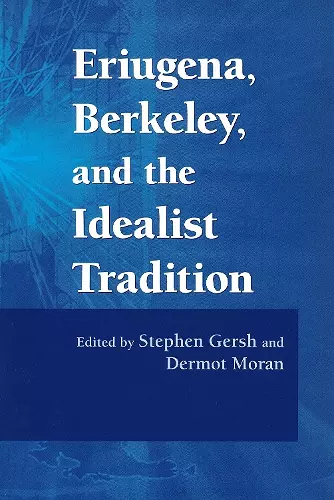Eriugena, Berkeley, and the Idealist Tradition
Stephen Gersh editor Dermot Moran editor
Format:Paperback
Publisher:University of Notre Dame Press
Published:15th Nov '06
Currently unavailable, and unfortunately no date known when it will be back

Eriugena, Berkeley and the Idealist Tradition is a collection of original essays presented at an international conference held in Dublin in 2002 and subsequently revised in light of discussions at the conference. As Stephen Gersh and Dermot Moran explain in their introduction, this book asks the question: What do philosophers mean by "idealism?" According to Gersh and Moran, the question of idealism is a difficult one, not only because of the historical complexity of the term "idealism" as they have sketched it but also because understanding of the phenomenon is dependent upon the observer's own philosophical persuasion. The essays in this volume take up the question of "idealism" in the history of philosophy from Plato, through late ancient and medieval thought, to Berkeley, Kant, and Hegel. Although there are obvious discontinuities among these versions of idealism, the degree of continuity is sufficient to justify a reexamination of the entire question.
The contributors cover a wide range of philosophical writers and texts to which the label "idealism" has been or might reasonably be attached. These include Plato, the Roman Stoics, the Neoplatonism of Plotinus, Augustinian Neoplatonism, Johannes Scottus Eriugena, the Arabic Book of Causes, George Berkeley, Immanuel Kant, and classical German idealism.
The contributors, senior scholars internationally acknowledged in their fields, include: Vasilis Politis, John Dillon, Vittorio Hösle, Gretchen Reydam-Schils, Andrew Smith, Jean Pépin, Dermot Moran, Stephen Gersh, Agnieszka Kijewska, Peter Adamson, Bertil Belfrage, Timo Airaksinen, Karl Ameriks, and Walter Jaeschke.
"This is a rich, subtle, thought-provoking collection on central, though neglected topics in idealism and its history, offering fresh and important insights into both familiar and less familiar major figures, views, and issues. Most important, perhaps, are its presentation and assessment of non-subjective forms of idealism, as well as mind-dependence forms of idealism prior to Descartes. Contemporary philosophers have become sophisticated about various forms of realism, anti-realism and irrealism. Such discussions, among others, will benefit significantly by accepting this volume's invitation to become more sophisticated about idealism as well. This very welcome contribution to the literature should find a broad readership." —Kenneth R. Westphal, University of East Anglia
"If it is true—as Hegel and his followers have claimed—that being and truth are indissociable from history, then philosophy cannot be successful if it limits itself exclusively to investigations of individual thinkers and periods. What is at stake, ultimately, is the development of Western thought as a whole. In this volume, a fine international group of scholars investigate the meaning of idealism across the ages. Without sacrificing nuance, their contributions show that a core of shared assumptions characterizes idealist philosophies. The historical dialogue which this volume advances emphasizes the relevance of ancient and medieval thinkers for the current debate, but it also challenges us to place modern representatives of idealism—such as Berkeley, Kant, and Hegel—in historical perspective." —Philipp W. Rosemann, University of Dallas
"All fourteen essays collected in this volume are solid pieces of scholarship, and the book as a whole is a welcome addition to the ongoing debate on the role that the history of philosophy can play in enriching our conceptual apparatus by reminding us of the complexity of our philosophical tradition. The book succeeds in reminding us that idealism is a constellation of different positions." —The Review of Metaphysics
"Fourteen essays trace the concept of idealism from Plato, the Roman Stoics, Plotinus, and Augustine through to Berkeley and the age of Kant and Hegel. Three papers on the ninth-century Irish writer Johannes Scottus Eriugena and on the Liber de causis, from ninth-century Baghdad, inspired by a concern to understand the common ground between medieval Neoplatonism and nineteenth-century Hegelian idealism . . . are especially instructive for medievalists." —Medium Aevum
"This is a very rich volume and constitutes a good starting point for a discussion of the multiple meanings of 'idealism.' In particular, it teaches the lesson that broad 'philosophical' definitions should be held in deep suspicion unless tied to specific contexts of discussion and specific historical periods." —Journal of the History of Philosophy
ISBN: 9780268029692
Dimensions: 229mm x 152mm x 18mm
Weight: 445g
328 pages